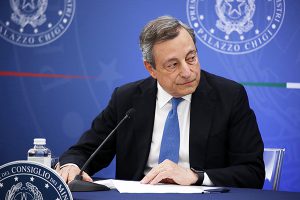Bloomberg
With Italy on the brink of chaos, Mario Draghi has less than a week to forge some difficult compromises with the populists in his government that have reluctantly backed him for the past 18 months.
The prime minister’s decision to offer his resignation plunged the euro area’s third-largest economy in a paralyzing political crisis that may end with snap elections just as the country grapples with an energy crunch, rising borrowing costs and an escalating conflict in Ukraine.
Draghi stepped in to lead a technocratic government when the previous administration collapsed in the depths of the Covid-19 recession. Boosted by over 200 billion euros ($200 billion) of aid from the the European Union’s recovery fund, the 74-year-old premier set about addressing some of the deep-seated problems that have held Italy’s economy back for decades.
But time is running short for the former head of the European Central Bank, with elections due early next year, even if he manages to navigate the current turmoil.
Italian bonds fell for a third day Friday, with the spread between Italy and Germany’s yield —a major gauge of risk in the region — widening further to 213 basis points. Italy’s stock market has fallen about 5.6% this week, more than twice the drop of the Stoxx 600. Italy has the worst-performing major index in Europe this year, down 26%.
The political chaos was triggered after the Five Star Movement, the second-largest party in Draghi’s alliance, boycotted a confidence vote in the senate, criticizing the government’s response to the economic crisis. Draghi said he couldn’t run a government without the backing of all his coalition partners.
Draghi said on Thursday that he could no longer trust the parties that backed his national unity government after Five Star leader Giuseppe Conte walked out of the vote.
President Sergio Mattarella sent the prime minister back to parliament to see if he could forge a renewed alliance with his broad but divided coalition. Parties may meet Monday to discuss the way forward, with Draghi due to address lawmakers early next week, which may be followed by a new confidence vote.
Draghi’s decision to resign, even though he still has a majority without Five Star support, underscores how crucial it is for him to have a unified coalition. Yet even if Draghi is able to patch up the spat among his allies, the government will come out of the crisis weakened.
Conte also needs to weigh whether early elections are in his benefit, since popular support for Five Star has fallen precipitously since the party entered government.
 The Gulf Time Newspaper One of the finest business newspapers in the UAE brought to you by our professional writers and editors.
The Gulf Time Newspaper One of the finest business newspapers in the UAE brought to you by our professional writers and editors.
